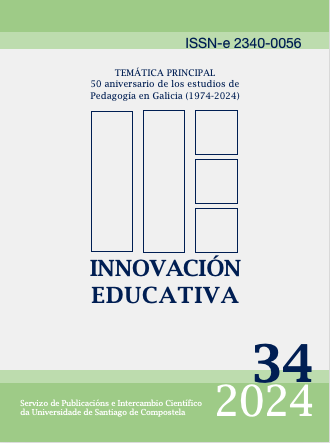APR3NDE: apoyo al aprendizaje infantil mediante un videojuego de refuerzo educativo en Android
Contido principal do artigo
Resumo
La pandemia de COVID-19 tuvo un impacto negativo en el aprendizaje de los niños y niñas en edad preescolar. Este trabajo propone un prototipo de videojuego que utiliza la gamificación para ayudar a los niños y niñas a aprender las letras y los números. El juego funciona de la siguiente manera: el niño o niña debe reconocer una letra o un número que aparece en pantalla cuando el sistema se lo indica fonéticamente. La letra o número a mostrar tiene en cuenta el historial del jugador o jugadora, de modo que el sistema se centra en los conceptos que el niño o niña necesita reforzar. De este modo, la aplicación diseñada también proporciona a los padres y madres y profesores y profesoras información sobre el progreso del niño o niña. Esta información se puede exportar a formato Excel para su posterior análisis, lo que puede ayudar a los educadores a identificar las áreas en las que el niño puede necesitar apoyo adicional. En general, el videojuego propuesto es una herramienta prometedora para ayudar a los niños y niñas en edad preescolar a aprender las letras y los números de forma divertida y atractiva. También es una herramienta valiosa para que padres y madres y profesores y profesoras sigan los progresos del niño y le proporcionen apoyo específico.
Palabras chave
Detalles do artigo
Citas
Almagro, M. L. B., Paterna, R., & Prados, M. Á. H. (2021). Gamificación educativa y videojuegos. Educación y futuro digital, (22), 69-84.
Cuba Rondón, E. B., & Pérez Mallea, I. (2021). Aplicación de la gamificación en el diseño de actividades en la educación a distancia. Revista Cubana de Ciencias Informáticas, 15(4), 366-380.
Egert, F., Cordes, A. K., & Hartig, F. (2022). Can e-books foster child language? Meta-analysis on the effectiveness of e-book interventions in early childhood education and care. Educational Research Review, 37, 100472. https://doi.org/10.1016/j.edurev.2022.100472
Kondirolli, F., & Sunder, N. (2022). Mental health effects of education. Health Economics, 31, 22-39. https://doi.org/10.1002/hec.4565
Marín-Suelves, D., Esnaola-Horacek, G., & Donato, D. (2022). Videojuegos y educación: análisis de tendencias en investigación. Revista Colombiana de Educación, (84), 1-17. https://doi.org/10.17227/rce.num84-12125
Martínez, C., Maurits, N., & Maassen, B. (2023). GraphoGame intervention as a tool for early diagnosis of reading difficulties in Spanish-speaking children with developmental language disorder. Child Language Teaching and Therapy, 39(1), 16-38. https://doi.org/10.1177/02656590221122989
Moreno Martínez, E. (2022, septiembre). El impacto de la pandemia en el uso de las TIC en el alumnado de los Grados de Educación Infantil y Primaria de la Universidad de Cádiz. Universidad de Cádiz. http://hdl.handle.net/10498/27325
Nikolopoulou, K. (2022). Online education in early primary years: Teachers’ practices and experiences during the COVID-19 pandemic. Education Sciences, 12(2), 76. https://doi.org/10.3390/educsci12020076
Nurhasanah, N., Masitoh, S., Arianto, F., & Ayubi, N. (2022). Development of Android application-based early childhood learning devices (PAUDPEDIA) during the COVID-19 pandemic. International Journal of Interactive Mobile Technologies (IJIM), 16(09), 231-238. https://doi.org/10.3991/ijim.v16i09.31703
Smith, J. A., & Jones, R. T. (2021). Digital technologies in early childhood education. Journal of Early Childhood Education, 45(3), 123-145. https://doi.org/10.1016/j.jece.2021.02.005
Theberath, M., Bauer, D., Chen, W., Salinas, M., Mohabbat, A. B., Yang, J., & Wahner-Roedler, D. L. (2022). Effects of COVID-19 pandemic on mental health of children and adolescents: A systematic review of survey studies. SAGE Open Medicine, 10, 20503121221086712. https://doi.org/10.1177/2050312122108671
Turner, K., DeCoster, J., Downer, J. T., & Williford, A. P. (2022). Elucidating linkages of executive functioning to school readiness skill gains: The mediating role of behavioral engagement in the PreK classroom. Journal of School Psychology, 60(4), 215-232. https://doi.org/10.1016/j.jsp.2022.01.006
Whittaker, J. E., Pianta, R. C., & Vitiello, V. E. (2020). The first-grade outcomes of Pre-K attendees: Examining benefits as a function of skill type, environments, and subgroups. Early Childhood Research Quarterly, 54, 1-14. https://doi.org/10.1016/j.ecresq.2020.01.004
Artigos máis lidos do mesmo autor/a(s)
- Juan Morales-García, Antonio Llanes, Andrés Muñoz, José M. Cecilia, Un proyecto innovador para acercar a estudiantes de educación superior a la realidad laboral , Innovación educativa: No 33 (2023): Innovación educativa en arte, ciencia e sociedade







